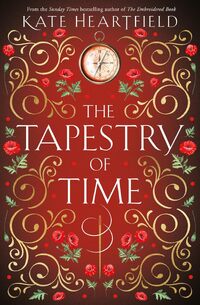 THE TAPESTRY OF TIME |
 Sunshine, secrets, and swoon-worthy stories—June's featured reads are your perfect summer escape. |

Purchase
Harlequin Presents 2509 Romance Series Excerpt of His Wedding-Night Heir by Sara CravenSHE was running. Forcing herself onwards down a long straight road, where flanking trees threw grotesque shadows in front of her. Shadows that she did not want to enter. Her breath tore at her lungs, and her legs ached, but she could not stop. And dared not look behind. Must keep going. Need to move on. The words beat a rhythm in her brain. Have to run. Have to... Cally Maitland sat up, gasping, her body damp with perspiration, as the sudden shrill of the alarm clock invaded her subconscious and brought her with shocking suddenness to the reality of a new day. She reached out a shaking hand and silenced the noise, then sank back against her pillow, trying to clear her head. My God, she thought. What was all that about? But of course she already knew. Because she'd had that dream before. Several times. The sun was pouring into the room through a gap in the shabby curtains, and it was clearly a beautiful May day. But Cally felt a chill in the air, and wrapped her arms round her body with a faint shiver. She said softly, half under her breath, "It is — definitely — time to go." She pushed back the thin quilt and got out of bed, running her fingers through her tousled light brown hair, smoothing it into its usual shoulder-length bob. That was one thing she had refused to economise on — her monthly trip to the best hair-dresser in town. There were shadows under her long-lashed hazel eyes, she realised, giving herself a swift, critical glance in the mirror, and the flowered cotton pyjamas she'd bought from a market stall covered her slim body without grace. She felt, she recognised with bewilderment, like a stranger in her own skin. A being totally alien to the cherished, pampered girl she'd been eighteen months ago. That girl had vanished for ever. Her mouth tightened with sudden bleakness. But there was no time to linger feeling sorry for herself, she thought, squaring her shoulders. Kit had phoned the previous evening to call an emergency breakfast meeting at the Children's Centre, and she couldn't be late. She collected clean underwear, and one of the plain grey skirts and cream blouses that formed her working gear, and headed for the small dank shower room which had been created in a corner of the attic room she inhabited. The landlord had thrown up cheap plywood partitions to divide the living space from the sleeping area, and pushed together a rudimentary kitchen with a sink and a gas stove in an alcove. He felt that entitled him to christen the whole thing a flat, but it was still nothing more than a draughty bedsit. To call it adequate would pay it an undeserved compliment, Cally thought, grimacing over the fact that her towel was still damp from the day before. It was not the kind of accommodation she had ever envisaged for herself. But it was just affordable, and it was also the last place on earth where anyone would think to look for her, and that was its major — its sole — attraction for her as far as she was concerned. Still she would bid it goodbye without a moment's regret. Although she couldn't say the same for Wellingford itself, oddly enough. She'd chosen it for the same reasons she'd picked the flat. It was a small, nondescript market town beside an unexciting river. A neutral background that she could disappear into. Somewhere to provide her with breathing space to think and consider her long-term future. She had not expected to like it, of course, Cally thought, trying to coax hot water out of the reluctant shower. She had certainly not anticipated being happy here either, yet somehow, against all the odds, she'd achieved a measure of both. There were times when she'd almost managed to forget her reasons for being there. Almost, but not quite. And now it was time to leave, she told herself. She'd already stayed more than a month over her allotted time, and she simply couldn't risk remaining any longer. Otherwise she might start to feel at home, and that was dangerous. She needed to keep moving. To cover her tracks. Although there was no actual proof that this was necessary, she reminded herself. No evidence of any attempt to trace her, as she'd feared. She could well be panicking unduly. Yet some gut instinct — some sense of self-preservation — seemed to be warning her again. Otherwise, why the dreams? In any case, there were valid, practical reasons for her to leave Wellingford. For one thing, the job she'd enjoyed so much no longer existed, and at the end of the week she would receive her final wage packet from the Hartley family. Who would begrudge her every penny of it. She sighed as she cleaned her teeth. She could still hardly believe that Genevieve Hartley was dead. She'd seemed indomitable — eternal. Even now, six weeks later, Cally half expected to see the large car draw up at the end of Gunners Wharf and Mrs Hartley's small, silver- haired figure alight. Riding to our rescue, Cally thought grimacing. Except it was far too late for that. I hope the dead can't see the living, she told herself with sudden fierceness. I hope Mrs Hartley doesn't know what her ghastly sons and their expensive wives did to her dream for Gunners Wharf even before she was cold in her grave. All those hopes and plans and hard work just swept away. All those people suddenly discovering they needed somewhere else to live. It shouldn't have happened, of course. Mrs Hartley's intentions had been very different. She'd meant the Gunners Wharf project to survive and thrive even when she was no longer there to supervise it. She'd been to see her lawyers, to draw up the necessary adjustments to her will, only to succumb to a sudden devastating heart attack before the all-important document could be signed. Even so, the residents had all hoped that her wishes would be respected. She'd made them clear enough even to her resentful children. So they'd collected for a wreath, and attended the funeral to demonstrate their affection and respect for the woman who'd encouraged their visions, only to find themselves totally ignored by the family, their presence unnecessary and embarrassing. A bad omen, Cally had thought at the time, unease twisting inside her. And her premonition had been quite correct. Within two weeks all the tenants had received notice to quit, and Gunners Wharf had been sold for redevelopment. They'd protested, naturally, but legally, they'd been told, they didn't have a leg to stand on. Their leases had been privately agreed with Mrs Hartley, and the rents kept deliberately, unrealistically low. But there'd been nothing in writing, and her sudden death had prevented her from regularising their position in law. Besides, it had been added, in a final blow to their hopes, most of the houses were still waiting to be renovated, and could well be deemed unfit for human habitation. As she put on her clothes Cally tasted the acid of tears in her throat, and swallowed them back. She'd become genuinely fond of Genevieve Hartley, and her death had been a personal blow, quite apart from all the other ramifications. On the other hand, the abandonment of the Gunners Wharf housing project would give Cally a personal release. I always knew my time here was limited, she reminded herself, applying moisturiser to her pale skin. But I thought I'd be the first to leave. Once again someone she loved had been suddenly and tragically taken away from her. And once again she was left floundering in a kind of limbo. Genevieve Hartley had been almost the first person Cally had met when she'd arrived in Wellingford. She'd been sitting in the bus station buffet, drinking coffee while she looked through the small ads in the local weekly paper, scanning them for job opportunities and room rentals, when she'd spotted the last entry in the 'Situations Vacant' column. "Administrative assistant required for housing project with Children's Centre," she'd read. "Enthusiastic and computer literate. Able to work on own initiative." Followed by a telephone number. Less than an hour later she'd been in Mrs Hartley's elegant drawing room, being interviewed. She'd been unfazed to find that her future employer was a chic elderly woman with steely blue eyes and an autocratic manner. She was used to ageing despots. In fact, she'd spent most of her life with one, she thought ruefully. So Mrs Hartley's brisk, searching interrogation had come as no real shock. Cally had sat composedly, answering the older woman's questions with quiet candour. Yes, she had references, but mainly for waitressing and shop work. She'd been taking a kind of gap year, she'd added, mentally crossing her fingers, travelling around and working at whatever jobs offered themselves. "But you have worked with computers?" Genevieve Hartley poured China tea into thin porcelain cups. "I need someone who can do word processing, keep records and oversee the on-going renovation scheme. Also act as liaison between the builders, the tenants and the Town Hall." She paused with a faint smile. 'My tenants at Gunners Wharf have not had easy starts in life, and this has made them wary, so sometimes the situation can become — shall we say volatile? I'm looking for someone who can sort out any snags before they become real difficulties." Cally hesitated. "I took computer studies during my last year at school." "Which school was that?" Cally told her, and the plucked brows rose. "Indeed?" said Genevieve Hartley. "Then I suggest a fortnight's trial on both sides. After all," she added drily, "you might find some of the tenants rather too much of a problem." I'd find not eating a much greater one, Cally thought wryly. Thought it but did not say it. "In addition to the administrative work you'll be asked to take your turn at the Children's Centre, particularly helping out in the coffee bar." She gave Cally an unexpectedly sweet smile. 'So your past experience could be useful, my dear." The money Mrs Hartley had offered was reasonable, but not lavish. It had enabled Cally to live, yet hadn't encouraged her to put down roots. Which was exactly what she needed. In time, when she was entirely free of her former life, she would find a home, and a career. Until then she would continue to be a nomad, because it was safer that way. Tonight, she thought, adding a muted lustre to her lips, she would get out her map book and decide where to go next. The river might sparkle in the sunshine, but the brightness did no favours to the dilapidated warehouses and crumbling sheds along Gunners Wharf itself. In many ways redevelopment was exactly what was needed for the entire area, Cally conceded reluctantly as she walked down to the Centre, where the admin office was based. But why did it have to happen at the expense of the housing scheme? Why couldn't they have existed side by side? Here, in the back street running parallel to the wharf, nearly half the properties had already been restored, with new windows and roofs, freshly pointed brickwork and gleaming paint. A lot of the work had been done by the tenants themselves, as an act of faith — an investment in a future that had now been taken from them, she thought bleakly. Mrs Hartley had provided the Children's Centre at her own expense, patiently providing funds to meet every new Health and Safety regulation that the local council could throw at them. It was no secret that it had cost her a small fortune, and maybe this was what her sons had resented so much. Because it was also known that Hartleys department store, like many other High Street shops, had been struggling for a couple of years, and needed a cash injection. Well, they certainly had it now, Cally thought, biting her lip. The sale had gone through so fast that they must have had a string of potential buyers already lined up. While the single mothers and families in badly paid work they were turning out would struggle to find alternative housing that they could afford. She sighed. But, as her grandfather had always said, one man's gain was another's loss. And the whole scheme had been living on borrowed time anyway. "Cally." A girl's voice broke across her reverie, and she turned to see Tracy approaching, pushing her baby buggy over the dilapidated pavement. "Cally — what's this meeting about? Do you know? Has Kit said anything?" Cally stifled a sigh, and pulled a silly face at the baby in the pushchair, an act rewarded by a lopsided grin. "Not a thing," she responded briskly. "But we don't live in each other's pockets, you know." She'd said it before so often, but no one seemed to take her denials seriously. Kit Matlock was the director of the Centre, and the man with whom she worked most closely. They were both, on the face of it, single, so assumptions were made. Nor could Cally deny that, before the recent bombshell, Kit had been making it clear he'd like to shift their professional relationship to a more personal level — which was, in itself, another excellent reason for moving away. Not that she disliked him. How could she? He was attractive, pleasant, and endearingly short on temperament. But they were not an item, and never would be. And Cally had resolutely made excuse after excuse to refuse his invitations. Their most intimate involvement to date had only been the sharing of sandwiches and coffee at lunchtime, in her small, crowded office at the rear of the Centre. And that was as far as it would ever go. Because, she told herself, I don't cheat. 'Oh," Tracy said, obviously disappointed. "I thought maybe he'd found a loophole in the law or something. And obviously he'd tell you first." Excerpt from His Wedding-Night Heir by Sara Craven |
|
| |||
|
||||



 © 2003-2025
© 2003-2025